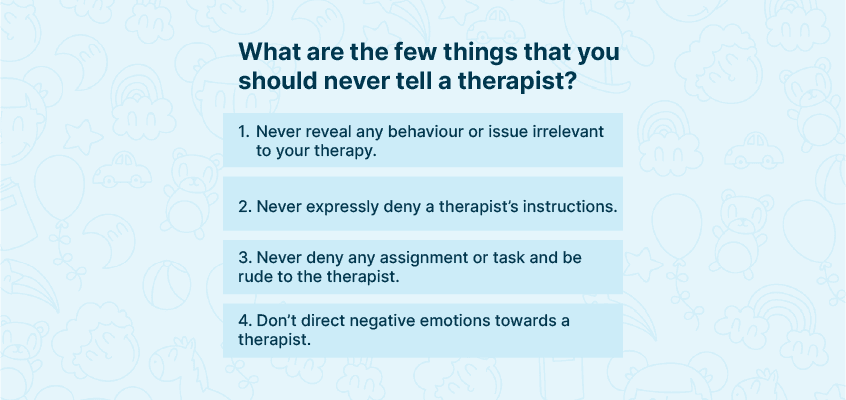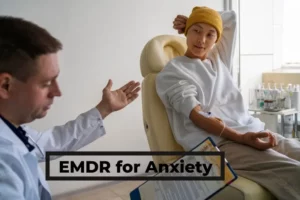Introduction
In recent times, therapy is considered the best way to deal with mental health concerns. However, should a person share everything with their therapist? The answer is no. For the simple reason that therapy has limitations as it is given and received by humans. A human is easily prone to bias. Even though therapists try their best to help every patient, they can’t understand every thought, feeling, and emotion. Therefore, a patient needs to be vigilant.
Mental well-being is a vital factor influencing a person’s behaviour and social relationships. However, each person has a different comfort zone while expressing or sharing thoughts with someone, let alone a therapist. Interacting with friends and family is always easier when compared to interacting with doctors, therapists, and strangers. In such cases, awareness and understanding of limitations are critical.
Therapy is nothing but a technique to bridge the gap between your consciousness and your real feelings. And a therapist generally acts as a guide to steer your mind-ship in the right direction. However, therapy is not about the therapist; it is about you.
Read more about How To Find An Effective Depression Therapist: A Step-By-Step Guide
What are the 10 things that you should never tell a therapist?
There are certain things that you are better off telling anyone, including your therapist. These are the things that you need to fix and realize individually. Hence, we have compiled a list of 10 things that you should never tell your therapist.
1. Never reveal any behaviour or issue irrelevant to your therapy
A therapist is mainly concerned about problems that an individual is suffering from and helps them discover an effective solution. It is irrelevant to share some darkest or deep issues with the therapist right away in most cases. The discussion should concentrate on the main issue and not shift the focus to other minor issues that might make the patient and the therapist uncomfortable at the beginning.
2. Never expressly deny a therapist’s instructions
Therapy is a recommendation that a therapist usually makes for the betterment of an individual. However, if the therapy seems to be out of the way or not something worth performing, then usually, we say, “I’m not going to follow the advice”, which is not necessarily a healthy thing to do. Every person requires time to process things, and similarly, the patient should be more tolerant and composed, allowing time for the therapy to show visible results.
3. Never deny any assignment or task and be rude to the therapist
Assignments are a kind of progress checker that helps the therapist determine the level of improvement since the last session. However, denying or being rude to the therapist should be avoided. Never say that ‘I didn’t do my homework.’ In case of any difficulties, the therapist and patient can mutually handle the situation.
4. Don’t direct negative emotions towards a therapist
Therapy, in most cases, is practised to avoid suppressing violent emotions such as anger and anxiety instead of dealing with them healthily so they don’t transform into negative thought patterns. However, you must not direct such negative emotions towards a therapist. You should remember that your therapist is not your enemy and is only trying to help you become a better person.
5. Don’t outrightly express a negative outlook for the therapy
The patient should not be pessimistic about the therapy; instead, take all the feedback positively and in a good spirit. Based upon surveys taken from people who have taken some treatment in the past – most people commit this common mistake. Without understanding the functional aspect of therapy, people often demean the therapy and the therapist itself.
6. Never ask for any confidential information about other patients
As a patient, you should never influence or force the therapist to share confidential information regarding other patients of the therapist. It is not only unethical but could also lead to legal repercussions. You should never try to bribe or use other unethical measures that put you or the therapist at risk.
7. Don’t indulge in arguments that express insensitivity towards any culture, race, gender, or sex
Even though every conversation between a patient and a licensed therapist is privileged and confidential, it must not be taken as an opportunity to defame or demoralize any culture, race, gender, or sex. The conversation should be restrained to therapeutic purposes and should not be extended otherwise. Mutual respect should be maintained between the patient and therapist. For instance, you should not insult, discriminate, or slander a therapist based upon their caste and religion. You must not reach insensible conclusions, and if there are any issues or doubts, then ethically connect with your therapist.
8. Try to avoid discussing work-life, especially if you’re bound by confidentiality
As long as necessary, a patient should only concentrate on personal therapy and avoid disclosing any work-related information to the therapist. Most corporations stress confidentiality and data protection. As a sensible employee, you must not disclose any confidential information, MNPI, or some other work-related info that is not related to your therapy.
9. The patient should not initiate any romantic conversation with the therapist
Sometimes, it is common for patients to get attracted to their therapist. Introverted patients especially have this tendency to feel delusionally connected with the therapist. Not only is it professional, but also beyond the ethical boundaries of the patient-therapist relationship.
10. Never disclose real names when talking about your personal life
We recommend that every individual planning for therapy abstain from using real names from personal life while sharing any incidents or feelings. It is possible that those people connect with the same therapist in the future or maybe presently connected. This could influence the outcomes of your therapy or may cause an impact on the other person’s therapy as well. We would also recommend that you not disclose any connection that may be related to the therapist.
Talk to Our Experts
Conclusion
To establish a strong patient-therapist bond, the patient should have a correct mindset before approaching a therapist. Moreover, proper bonding will only lead to progress in your therapy and help you become a better person. Additionally, good bonding with the therapist makes the patient feel respected and safe. However, if you end up developing or facing any violent or negative emotions at any point, you must try to exercise control and only communicate them properly and healthily.
Therapists are expected to follow strict guidelines and deal with patients as prescribed in the ethical code of conduct. However, the relationship between the patient and therapist must be open and trustworthy, and all communication must be done maturely and sensibly, keeping in mind all the possible repercussions.
Explore Our Self-paced Courses
Unlock Exclusive Benefits with Subscription
-
Premium Resources

-
Thriving Community

-
Unlimited Access

-
Personalised Support













